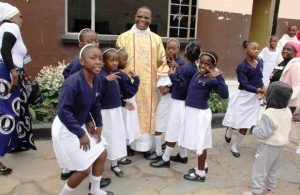On 1st June this year, the Comboni Missionaries celebrate 150 years of their foundation. Not long before, on the 16th April, Comboni Missionary Fr David Glenday celebrates forty years of priesthood. Here, drawing out the missionary meaning of gratitude, he shares something of what these two significant milestones mean to him personally. From 1991 to 1997, Fr David was superior general of his Congregation, and, after eleven years spent in the Philippines, he now serves as secretary general of the Union of Superiors General.
Anniversary, celebration, remembrance, memory: all these things are readily and rightly associated with inspiring a sense of gratitude. Yet, at its most authentic, gratitude is more than a passing sentiment, more than a stirring emotion. At its deepest, gratitude is a journey, a discovery, a new beginning. As Pope Francis has remarked, “the joy of the missionary always shines against the backdrop of a grateful memory”, because “a disciple is fundamentally someone who remembers”.
Gratitude is not static, but dynamic; gratitude is movement – inwards, outwards, and forward, and mission is truly a journey into gratitude.
Gratitude, in the first place, means to know – in the deep, rich and biblical sense of knowing – that the deep – down meaning of everything is love, or, as Cardinal Carlo Martini, archbishop of Milan once memorably put it, “Everything has a meaning, and this meaning is luminous and life-giving. In other words, despite the darkness of humanity’s current circumstances, despite the human tragedy surrounding us, despite the trials of the Church and the well-nigh absurd situations through which the world and we ourselves have to pass, at the bottom of everything there lives a Gospel, a Gospel which assures us that that there is indeed a luminous and life-giving reason for all these things, if only we know how to grasp it and let ourselves be transformed by it”.
This is gratitude’s first challenge: to let myself be led to the experienced conviction that the key which unlocks the mystery of existence is Grace, and that Grace is present in history – in our/my story – as Providence. Grace is active and at work, always; Grace searches us out, and waits for us to catch up; Grace never loses hope in us, and is always ready to begin again; Grace always grows, and always has dreams for our future. Grace always hopes, because Grace believes in us.
So to be grateful effectively means to re-read our history and our stories: How, where, by whom have I been loved? What has been the name, the face, of love for me, for us? How has Grace made it possible for me, too, to love? In this sense, the journey of gratitude will perhaps often mean surprise and unexpectedness, a whole new and different way of seeing things.
I find something very encouraging about the fact that Jesus foresees that his disciples are likely to forget what he has said while with them, and that he knows his Father will send the Spirit to help them with this amnesia of theirs. There is a powerful and consoling insight here: for the disciples, for us, remembering is in the first place not an effort or project of our own, but a gift, a grace, a work, of the Spirit. 150 years of my Institute, 40 years a priest: to keep an anniversary is not in the first place something we do for ourselves, but rather something the Spirit does in us and with us: in the end, the one who really remembers is the Spirit. And this means that remembering, when thus rooted and founded, is likely to trigger fresh discovery and surprise.
Each of us individually, and all of us together, can experience this gift of Spirit-led remembering. For my part, recently I have sensed that this grace has been offered to me in two distinct and rather beautiful ways.
First, I have been, as it were, brought to remember times, situations, encounters, circumstances of life, that for many years I had simply forgotten. Now, as they come once again and unexpectedly to mind, they become new and deeper reasons to be grateful, to say, perhaps even to sing, the Lord was in that place, at that time, in those persons. It is as if the Spirit – precisely as Jesus promised – leads us to hear the word of love that Jesus was saying to us long ago in those experiences. There is an exciting challenge here – discovering in this way how great the potential of our personal and community history is, and to treasure, cherish and re-visit that history in ever renewed hope and expectation.
Second, I have noticed the Spirit nudging me not only to re-call apparently forgotten times and experiences, but also to re-read only too well remembered experiences in a new way. Times, until now, read as times of hurt emerge, as times of healing; times of sin and fragility are revealed as places of mercy and wisdom; times of fault are recognised as places of joy: felix culpa, happy fault, fortunate fall; times of sin, as times of forgiveness and growth in compassion. In Gospel terms, to remember is to be transformed.
The first line of the first poem in Irish poet Seamus Heaney’s last book of poems runs like this – “Had I not been awake I would have missed it…. The poem, written after Heaney had suffered a severe stroke is, we might say, a hymn to attentiveness. The sudden and unexpected experience of serious physical fragility had brought Heaney to a new and deeper appreciation of the preciousness and beauty of being alive, and this had made him more attentive to the power of life in the present moment.
So, true gratitude is never mere nostalgia, a hankering after the old days. True gratitude heightens my awareness of and deep respect for the present moment, so as to discover and cherish the seeds of the future. A grateful person will tend to be a person willing to accept the challenge of discernment, very likely identifying with some of the things Pope Francis shared when he met the superiors general in November 2016. “I am very keen on the theme of discernment… We are used to formulas, to black and white, but not to the grey areas of life. And what counts is life, not the formulas. We need to grow in discernment. The logic of black and white can bring casuistic abstraction. Instead, discernment means going beyond the grey of life in a search for the will of God. And you look for the will of God following the true doctrine of the Gospel and not in the fixations of an abstract doctrine… This is the key point: discernment is always dynamic, as is life. Static things don’t work… So two words: listening and movement. This is important”.
Or, in Heaney’s terms, gratitude means staying awake, and so not missing the movement of new life.
Given all this, it comes as no surprise to find that gratitude in the end turns into mission, that thankfulness lies at the heart of every authentic outreach to others. Gratitude sends us out, urges us into the future, rekindles the dream, challenges to commitment, makes giving joyful. Mission as gratitude enacted is a recurring and ultimately delightful theme in the lives of many outstanding missionaries.
So then, mission: a journey from gratitude into gratitude, a place where praise is discovered ever anew, in the folds of real life, with all its beauty, challenge and opportunities to begin afresh. Or, as St Augustine urged his people in his famous Easter homily.
Brothers and sisters, see that your praise comes from your whole being; in other words, see that you praise God not with your lips and voices alone, but with your minds, your lives and all your actions.






